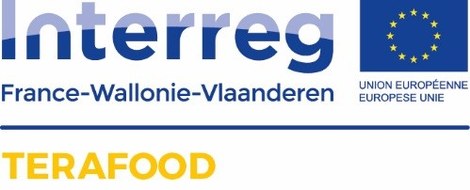Interreg France-Wallonie-Vlaanderen - TERAFOOD
Interreg France-Wallonie-Vlaanderen
The aim of the project is to develop a compact and low-cost sensor that can be applied for the monitoring of the quality of packaged food. This will allow for extended shelf lives and the reduction of food waste. The project is coordinated by the CNRS (Institute of Electronics, Microelectronics and Nanotechnology, Lille) and involves partnership of VMicro SAS, Ghent University, Université du Littoral Côte d’Opale, Flanders’ FOOD. This is a 4-year project.
- French and Dutch summary below -
Description of the project

The consortium consists out of both industrial and academic partners with the necessary expertise to produce the sensor. Moreover, the consortium has partners (Food2Know, Flanders’ FOOD, …) that are specialized in bridging the space between the academic world and the industry. These partners will be responsible for valorization and the dissemination of the sensor technology. Furthermore, they will generally disseminate the terahertz technology through their respective networks and look for new applications in cooperation with experts from the industry and the academic world.
Objectives
The main objective of Terafood is:
- The development a compact and low-cost sensor that can be applied in food packages and is able to monitor the quality of the food and as such reduce food waste.
Role of Ghent University
- The Photonics Research Group of Ghent University is in charge of designing, developing and validating the sensor.
- The Laboratory of Food Microbiology and Food Preservation and NutriFoodChem (Department of Food Safety and Food Quality) is in charge of investigating the volatile compounds produced during food preservation and food spoilage.
- Food2Know is in charge of communication, dissemination and valorization activities.
Dutch summary
Het doel van het project is een compacte en goedkope sensor te ontwikkelen die gebruikt kan worden in voedselverpakkingen om voedselkwaliteit te monitoren en voedselverlies te reduceren. Het project wordt gecoördineerd door CNRS (Instituut voor Elektronica, Micro-elektronica en Nanotechnologie, Rijsel) en heeft als partners VMicro SAS, Universiteit Gent, Université du Littoral Côte d’Opale en Flanders’ Food. Dit project duurt 4 jaar.
Het project heeft als doel om een commerciële voedselsensor te maken. Deze sensor laat toe om de kwaliteit van voedsel in een verpakking na te gaan. Doordat de sensor zal toelaten de kwaliteit van individuele verpakkingen op elk moment te controleren, zal toepassing van deze sensor het mogelijk maken voedselbederf in de voedingsindustrie tegen te gaan. Door het terugdringen van het probleem van voedselbederf en voedselverspilling in de voedingsindustrie, een sector die heel veel welvaart creëert in de grensregio, vermoeden we dat het project een grote impact zal hebben op de economie in de grensregio.
Het consortium bestaat uit partners uit de academische wereld en de industrie met de nodige expertise om de sensor te fabriceren. Het consortium heeft verder een aantal partners (Food2Know, Flanders’ FOOD,..) aan boord die gespecialiseerd zijn in het overbruggen van de ruimte tussen de academische wereld en de industrie. Deze partners zullen toezien op de valorisatie en de disseminatie van de sensortechnologie. Verder zullen zij via hun respectievelijke netwerken de terahertz technologie in het algemeen dissemineren en op zoek gaan naar nieuwe toepassingen in samenwerking met experts uit de industrie en de academische wereld.
French summary
Le but du projet est de développer un capteur compact et bon marché qui peut être utilisé dans des emballages de nourriture afin de contrôler la qualité de la nourriture et ainsi réduire les déchets. Le projet est coordonné par CNRS (Institute d’Electroniques, Microélectroniques et Nanotechnologie, Lille) et les partenaires sont VMicro SAS, Université de Gand, Université du Littoral Côte d’Opale et Flanders’ Food. Le projet dure 4 années.
Le projet vise à créer un capteur commercial pour senser la nourriture. Ce capteur permet de vérifier la qualité des aliments emballés dans un paquet. Parce que nous proposons de pouvoir contrôler la qualité des emballages individuels, à tout moment, le consortium est convaincu que ce projet préviendra la détérioration des aliments dans l'industrie alimentaire. Ce projet aura un impact déterminant sur l'économie de la région transfrontalière en proposant une solution pour réduire drastiquement le problème de la détérioration des aliments et des déchets alimentaires dans l'industrie alimentaire, un secteur qui crée beaucoup de richesse dans la région frontalière.
Le consortium comprend des partenaires universitaires et industriels avec l'expertise nécessaire pour fabriquer ce capteur. Le consortium a également un certain nombre de partenaires à bord qui sont spécialisés pour combler le fossé entre le monde universitaire et celui de l'industrie. Ces partenaires vont assurer la valorisation du capteur développés et la dissémination des résultats obtenus. En outre, ils assureront via leurs réseau de contacts industriels alimentaires (Food2Know, Flanders’ FOOD, ..) la diffusion et la vulgarisation de l'utilisation de la technologie terahertz en général et la recherche de nouvelles applications, en coopération avec des experts de l'industrie et du milieu universitaire.
Contact
Prof. Bart Kuyken - Department of Information Technology
Phone number: +329 264 33 35
E-mail: Bart.Kuyken@UGent.be
Dr. Isabelle Sioen – Food2Know
Phone number: +329 264 93 95
E-mail: Isabelle.Sioen@UGent.be
Avec le soutien du Fonds européen de développement régional – Met steun van het Europees Fonds voor Regionale Ontwikkeling
